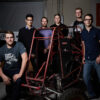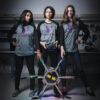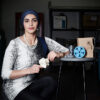It’s called the Centre for Entrepreneurship and Engineering Design (CEED), an initiative of the University of Ottawa’s Faculty of Engineering, co-funded by the faculty, alumni and NSERC.
It’s mission? To improve the level and quality of engineering design, and entrepreneurship education and experience. This is achieved by:
Giving students repeated opportunities throughout their studies to design, build and test products that meet customer needs.
Integrating customer discovery and validation into the design engineering process so students appreciate the need to design a product that will appeal to a target market.
Developing students’ business acumen, through introduction to essential business concepts and exposure to industry.
Fostering sales and communication skills.
Providing experiential learning opportunities with industry through design and prototyping services and technology commercialization.
“Through CEED, startups and growth-stage companies have access to talented students who can work on design projects with CEED facilities and resources. They can also secure funding support to offer students paid internships.”
CEED includes:
The Richard L’Abbé Makerspace, where anyone is welcome to invent, play, design and build, using 3D printers, Arduinos, virtual reality tools, laser cutters and much more.
The Makerlab, which provides students with a structured learning experience using technologies like those at the Makerspace.
The Manufacturing Training Centre (MTC), where students get formal instruction on how to fabricate in a traditional machine shop.
The Brunsfield Group Student Engineering Project and Entrepreneurship Centre, which features tools and equipment to design, fabricate and test complex prototypes, including welders, modern CNC mills and plasma cutters.
In addition:
The Sandbox provides a collaborative space for engineering students involved in small projects, pre-professional competitions and entrepreneurial projects.
The Project Integration and Team Space (PITS) focuses on providing pre-competitive teams involved in large-scale projects with the space and infrastructure required to succeed.

Bringing great ideas to life … and to market
Through these facilities, a dynamic team of top engineering students offer their creativity and skills to help companies and entrepreneurs bring their ideas to life, quickly and cost effectively.
Projects from the CEED Design Services team have included a tumor scanner, in collaboration with Dr. Arnault from the Faculty of Medicine. This device uses cameras to map the deformation of a tumor from each angle. This image data can be used to reconstruct a model of the tumor and analyze how it was deformed – information that’s useful in medical research to better understand a tumor’s characteristics. The results of this project were published in a medical journal.
CEED also offers a 360-degree video service for virtual reality marketing and promotion of a product, event or business. This is also known as immersive video. A view in every direction is recorded at the same time using six cameras.
“We are open to any proposal from the community, and we can contribute with all phases of product development: consulting, designing, prototyping and manufacturing,” said Chris Falconi, who heads CEED’s design services effort. “Newly educated minds often bring a fresh dose of innovation and creativity that elevates what our clients want to achieve.”
It’s also a much more economical way for startups and entrepreneurs to tap into top-end fabrication technology and current expertise versus working with a third-party design firm.
“We already have all the equipment on site and our students love to work on tangible projects with real market applications,” Falconi said.

A running start for startups
Thanks to CEED’s donors and other funding mechanisms, students can also tap into great work experience opportunities with paid internships and coops. This is particularly valuable for lean startups trying to bring their products to market.
This model has worked well for uOttawa alumni Charles Blouin. He hires paid interns through CEED with funding support to subsidize their salaries.
Blouin is a true CEED success story. His startup RC Benchmark builds testing tools for drone designers. The business was incubated on the uOttawa campus with CEED support and now exports to customers around the world.
“It’s a tremendous value for us to be able to offer competitive salaries to attract skilled students for programming and design,” Blouin said. “Unlike government funding programs like the Scientific Research and Experimental Development Tax Incentive (SR&ED), we can obtain these funds up front with CEED, instead of having to pay out of pocket and recoup the costs later. This makes a big difference for a cash-poor startup.”
CEED has allowed many young people to pursue their entrepreneurial ambitions from a running start.

Prosthetics for war amputees
Take Midia Shikh Hassan. She is co-founder of Dextra. This students-led social initiative is working to provide 3D-printed prosthetics to the large numbers of war-amputee refugees in regions of Africa and the Middle East.
Dextra began as a project in a CEED Difference Makers workshop. The team then accessed various CEED resources for business modelling, prototyping and design. Team members have also benefited from uOttawa’s Technology Entrepreneurship course, to develop their business acumen.
Shikh and her colleagues have already field-tested their design in refugee camps with prototypes developed at the Richard L’Abbé Makerspace, and taken advantage of CEED’s internship funding for further design and business development.
“CEED provided us with the support to move from an idea stage to an implementation stage in one year,” Shikh said. “Without that support, Dextra would not have been able to reach its current stage within the same time frame.”

Real-time analytics for sports teams
Then there is Tunch Akkaya and his startup, GameStrat.
GameStrat specializes in real-time analytics software for the sports market, to provide coaches with instant video replays through wireless networks in stadium dense environments. This too is a startup incubated through CEED programs, including the university’s various entrepreneurial competitions.
Initially targeted at the football industry, GameStrat has recently branched out to include volleyball, basketball and, in true Canadian fashion, hockey.
“We are in the process of securing the Canadian football market and will launch for other sports this summer,” Akkaya said. “The funding and support we have received through CEED has been crucial to advance all aspects of our business, including R&D, marketing and sales.”
To learn more about how you can accelerate your business’s time to market with CEED facilities or subsidize the cost of hiring student talent, please visit engineering.uottawa.ca/entrepreneurship/ceed

